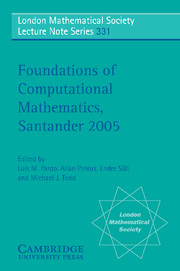Book contents
- Frontmatter
- Contents
- Preface
- 1 Non Universal Polynomial Equation Solving
- 2 Toward Accurate Polynomial Evaluation in Rounded Arithmetic
- 3 Sparse Grids for Higher Dimensional Problems
- 4 Long-time Energy Conservation
- 5 Dispersive Properties of Numerical Schemes for NSE
- 6 Eigenvalues and Nonsmooth Optimization
- 7 Discrete Noether Theorems
- 8 Hyperbolic 3-Manifolds and Their Computational Aspect
- 9 Smoothed Analysis of Algorithms and Heuristics
- 10 High-dimensional Transport-dominated Diffusion Problems
- 11 Greedy Approximations
1 - Non Universal Polynomial Equation Solving
Published online by Cambridge University Press: 13 May 2010
- Frontmatter
- Contents
- Preface
- 1 Non Universal Polynomial Equation Solving
- 2 Toward Accurate Polynomial Evaluation in Rounded Arithmetic
- 3 Sparse Grids for Higher Dimensional Problems
- 4 Long-time Energy Conservation
- 5 Dispersive Properties of Numerical Schemes for NSE
- 6 Eigenvalues and Nonsmooth Optimization
- 7 Discrete Noether Theorems
- 8 Hyperbolic 3-Manifolds and Their Computational Aspect
- 9 Smoothed Analysis of Algorithms and Heuristics
- 10 High-dimensional Transport-dominated Diffusion Problems
- 11 Greedy Approximations
Summary
Abstract
These pages summarize some results on the efficiency of polynomial equation solving. We focus on semantic algorithms, i.e., algorithms whose running time depends on some intrinsic/semantic invariant associated with the input data. Both computer algebra and numerical analysis algorithms are discussed. We show a probabilistic and positive answer to Smale's 17th problem. Estimates of the probability distribution of the condition number of singular complex matrices are also exhibited.
Introduction
These pages summarize some results on upper and lower complexity bounds in Elimination Theory. They are a revision of the program stated in Pardo (1995).
We focus on Efficient Polynomial Equation Solving. This is one of the challenges in the recent history of Computational Mathematics. Two main frameworks in scientific computing deal with this problem. Following different approaches, symbolic/algebraic computing and numerical analysis developed their own techniques for solving polynomial equations. We survey statements of both approaches. New results are contained in Sections 1.4 and 1.5.
Multivariate Polynomial Equation Solving is a central topic both in Computational Mathematics and Computational Algebraic Geometry (Elimination Theory in nineteenth century terminology). Its origin goes back to work of Sturm, Hermite, Cayley, and Sylvester, among others. Elimination Theory consists of the preparation of input data (polynomial equations and inequalities) to answer questions involving quantifiers. This approach also underlies Kronecker (1882), Hilbert (1890) and further developments in Algebraic Geometry.
Information
- Type
- Chapter
- Information
- Publisher: Cambridge University PressPrint publication year: 2006
Accessibility standard: Unknown
Why this information is here
This section outlines the accessibility features of this content - including support for screen readers, full keyboard navigation and high-contrast display options. This may not be relevant for you.Accessibility Information
- 3
- Cited by
